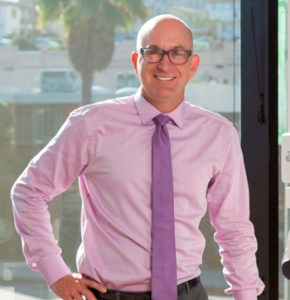By Laura Thill
Cosmetic dentist donates his services to help survivors of domestic and violent abuse.
 If a smile speaks a thousand words, so too does the lack of one. The National Coalition Against Domestic Violence (NCADV) estimates that more than 10 million people living in the United States experience physical domestic abuse each year. “Domestic violence is prevalent in every community and affects all people regardless of age, socio-economic status, sexual orientation, gender, race, religion or nationality,” the organization states on its website. “Domestic violence can result in physical injury, psychological trauma and even death. The devastating consequences of domestic violence can cross generations and last a lifetime.”
If a smile speaks a thousand words, so too does the lack of one. The National Coalition Against Domestic Violence (NCADV) estimates that more than 10 million people living in the United States experience physical domestic abuse each year. “Domestic violence is prevalent in every community and affects all people regardless of age, socio-economic status, sexual orientation, gender, race, religion or nationality,” the organization states on its website. “Domestic violence can result in physical injury, psychological trauma and even death. The devastating consequences of domestic violence can cross generations and last a lifetime.”
Dr. Michael Fulbright’s affiliation with the American Academy of Cosmetic Dentistry (AACD) has taught him that while an abuse victim’s healing may begin in a hospital emergency room, it’s often not complete without a major dental restoration. For the last 10 years, the Redondo Beach, California-based cosmetic dentist and owner of Fulbright Cosmetic & Reconstructive Dentistry has participated in the AACD Charitable Foundation’s Give Back a Smile program, providing advanced dental treatment to survivors of domestic abuse free of charge. “This has been a great opportunity,” says Fulbright. “I have never turned a patient away and always provide treatment above and beyond the basic necessities. I figure, if I can do more for patients, why not?”
An emotional ride
Working with survivors of abuse has been fulfilling, notes Fulbright; at the same time, the experience has been an emotional one. “These patients have gone through a lot,” he points out. “Many of them are missing their front teeth.” Ideally, he works to restore their ability to smile, but sometimes, that can be challenging. For instance, he had a recent patient who was a victim of domestic abuse in 1975. When the woman’s husband passed on, she was finally willing to contemplate a restoration, however she was concerned about losing her few remaining teeth.
In another case, a man was beaten up by his partner, and Fulbright provided a full-mouth restoration. “He was a street performer, so this was essential,” he says. In a third case, he treated a man who was beaten up in nearby Long Beach, California while walking with his partner. “Abuse is a difficult, traumatic thing to get past,” he says. “But, I like that I can give these patients a second chance.”
Indeed, Fulbright has seen his patients move on to new relationships and job opportunities. Some have even become regular patients at his practice. “Once I complete a restoration, I’m not liable for future care, but I always make it a point to follow up with patients,” he says. After all, he explains, patients must demonstrate a substantial level of commitment to be admitted into the program. Not only must they submit to a strenuous vetting process by NCADV, they risk being kicked out of the program if they fail to return a call to Fulbright’s practice or don’t show up to their dental appointment. “NCADV tracks these patients carefully, as well as the amount of work and expenses I donate,” he says.
“This has been a great experience for me. These patients have been through a lot and [they deserve] the ability to smile.
Give Back a Smile
The Give Back a Smile (GBAS) program began in 1999. Since then, AACD member dentists, dental laboratories and other dental professionals have volunteered their time and expertise pro bono to provide care to over 1,600 patients, at a value of $16+ million in donated dental services.
To be eligible, patients must:
- Be 18 years or older and receive dental injuries to the smile-zone from a former intimate partner/spouse or family member. This includes sexual assault and rape victims.
- Be away from all abusive relationships with an intimate partner or spouse and/or living in a separate home from an abusive family member, for a minimum of one year.
- Wait one year after a sexual assault.
- Meet at least once with a domestic violence/sexual assault advocate, case manager, counselor, faith leader, therapist or doctor with experience in counseling survivors of domestic violence/sexual assault.
The program does not help with dental neglect (such as cavities), gum disease, jaw injuries or orthodontic treatment (braces, shifted teeth, and/or spaces between teeth). Nor does it replace or fix previous dental work completed by any dentist.
In order to apply for the program, patients must pay a $20 application fee or complete 10 hours of community services.
For more information visit https://www.aacd.com/index.php?module=cms&page=1932.

